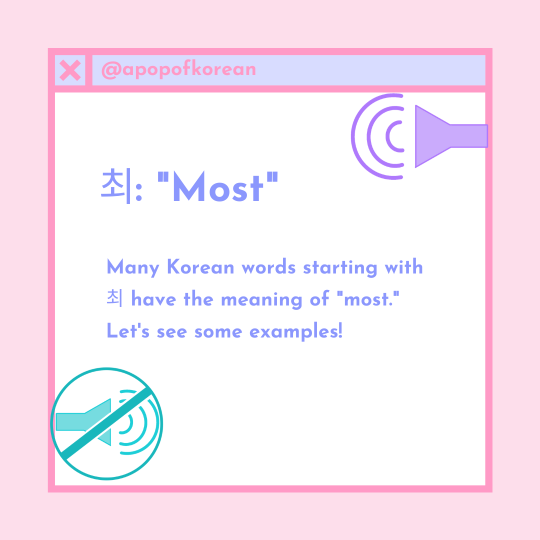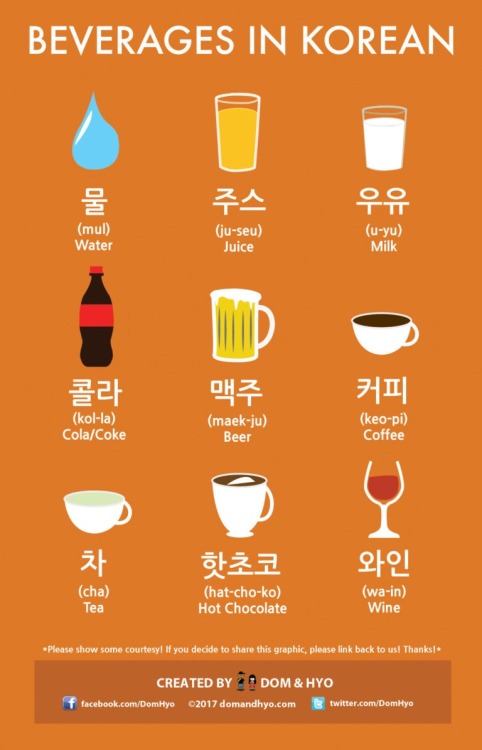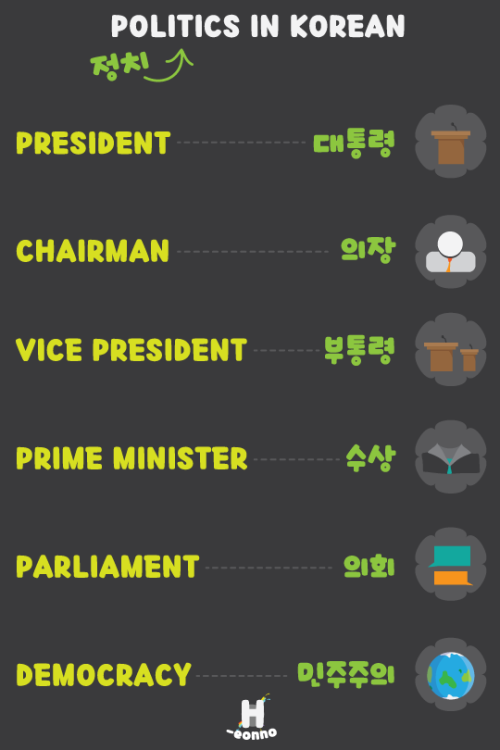#korean vocabulary
VOCABULARY LISTS: MASTERPOST
[Vocabulary by Topics]
-Vocabulary: Jobs (occupations 2)
-Vocabulary: School/School subjects
-Vocabulary: Positive Emotions
-Vocabulary: Airport, Airplane
-Vocabulary: Everyday objects at home
-Vocabulary: Electronic Devices
[Hanja, Idioms, Proverbs]
-Korean Proverbs and Vocabulary
-Learn Korean with Hanja - 화 (化)
[Vocabulary by parts of speech]
-Vocabulary: Active and passive verbs
updated 2021/03/19
*All verbs below are in original form(dictionary form).
존재하다 : to exist
선언하다 : to declare, proclaim
목격하다 : to witness
제안하다 : to suggest
조언하다 : to advise
개입하다 : to intervene
헌신하다 : to devote
축하하다 : to congratulate
환영하다 : to welcome
접근하다 : to approach
투자하다 : to invest
개선하다 : to improve
응원하다 : to cheer, support
설명하다 : to explain
오해하다 : to misunderstand, misconceive
해결하다 : to resolve
조절하다 : to adjust
계획하다 : to plan
보호하다 : to protect
조사하다 : to investigate
확인하다 : to check, verify, confirm
출발하다 : to depart, set off, start
도착하다 : to arrive, reach
설득하다 : to persuade
양보하다 : to yield, give way
희생하다 : to sacrifice
쟁취하다 : to achieve, win
야기하다 : to cause, bring about
실수하다 : to make a mistake
긍정하다 : to affirm
부정하다 : to deny
생산하다 : to produce
소비하다 : to consume, spend
인정하다 : to admit
소유하다 : to own, possess
봉사하다 : to serve, do volunteer work
유지하다 : to maintain
보조하다 : to assist
인용하다 : to quote, cite
대표하다 : to represent
선택하다 : to choose, select
거절하다 : to reject, refuse
촉진하다 : to promote, accelerate, boost
요구하다 : to demand, ask
사과하다 : to apologize
추측하다 : to guess, suppose
간섭하다 : to interfere
낭독하다 : to read aloud
관찰하다 : to observe
추구하다 : to pursue, seek
Written and edited by Admin Yu

눈 : snow
첫눈 : first snow of the winter
눈송이 / 눈꽃 : snowflake
결정 : crystal
서리 : frost
함박눈 : big snowflakes
진눈깨비 : sleet
눈보라 : blizzard
우박 : hail
폭설 : heavy snow
만년설 : perpetual snow
설경 : snow scenery
눈사람 : snowman
눈덩이 : snowball
눈싸움 : snowball fight
눈이 내리다 : to snow
얼다 : to freeze
녹다 : to melt, to thaw
하얗다 : white
새하얗다 : pure white
희다 : white
차갑다 : cold
춥다 : cold (weather)
(손이/귀가/코가) 시리다 : (hand/ear/nose is) cold
펑펑 : (adverb) shape of snow falling heavily (ex. 함박눈이 펑펑 내린다)
펄펄 : (adverb) shape of snow or powder blowing in the wind (ex. 흰 눈이 펄펄 내린다)
소복소복 : (adverb) shape of things piled up (ex. 길에 눈이 소복소복 쌓여 있다)
뽀드득 : (adverb) sound of stepping on a pile of snow
It’s snowing heavily in Korea!
-Written and edited by Admin Yu
직업 Job
의사 Doctor
간호사 Nurse
변호사 Lawyer
검사 Prosecutor
판사 Judge
기자 Reporter
아나운서 Announcer
선생님 Teacher
소방관 Firefighter
기술자 Engineer
미용사 Hairdresser
기업인 Business person
조종사 Pilot
기사 Driver
경찰관 Police
인명구조원 Life guard
우주비행사 Astronaut
배우 Actor
작가 Writer
요리사 Chef
Written by Admin Na
Edited by Admin Yu
유행 - trend
스타일 - style
대중 - public
정장 - suit
청바지 - (blue) jeans
겉옷 - outer clothing
가디건 - cardigan
코트 - coat
스웨터 - sweater
평상복 - casual
운동복 같은 - sporty
소가죽 - cowhide
리넨, 아마 섬유 - linen
예스럽다 - vintage(빈티지)
상징 – logo(로고)
소매 - sleeve
시즌 컬러 - season color
헐렁한 - baggy
(길이가) 무릎까지 오는 - knee-length
초라한 - tacky
슬랙스 - slacks
단화 - loafers
블라우스 - blouse
액세서리 - accessory
보석 - jewel
입다 - put on
Written by Admin Hee
Edited by Admin Yu
Hello Everyone! This is Admin Sun with a survey on Korean dramas! We would really appreciate it if you could fill this out for us <3 All of us are Native Koreans, so we enjoy hearing foreigners’ opinions on Korean Culture and language! Also, if you’re learning Korean, please take the time to fill out our other survey for foreigners learning Korean <3 Thank you so much! Reblogs are very appreciated
Here’s a small vocabulary list based on words relating to dramas and surveys!
✎드라마 Drama
✎좋아하다 To like
✎주인공 Main Character
✎등장인물 Character
✎배우 Actor
✎대본 Script
✎시점 Point of view
✎촬영하다 To film
✎방송 Broadcast
✎영상 Video clip
✎보다 To see / watch
✎한국어 Korean (language)
✎대중 문화 Pop culture
✎대중 매체 Mass Media
✎문화 Culture
✎인기 Popularity
✎인기 있다 To be Popular
✎연예인 Celebrity
✎출연하다 To appear (in smth)
✎설문조사 Survey
✎배우다 To learn
✎응답하다 To answer
<the Name of Various Kind of Cities 도시의 명칭>
고대도시 ancient city
중세도시 medieval city
상업도시 commercial city
공업도시 industrial city
신도시 new town
소도시 small town
대도시 metropolis
<Urban Problem 도시문제>
오염 pollution
주택부족 housing shortage
불량주택 substandard housing
교통혼잡 traffic congestion
범죄 crime
알코올중독 alcoholism
빈부격차 rich poor gap
빈곤 poverty
경기침체 economic recession
실업 unemployment
<Things in the city 도시 관련 단어>
도로표지판 street sign
대중교통 public transport
교통경찰 traffic cop
보행자 pedestrian
보도 sidewalk
버스정류장 bus stop
지하철역 subway station
주차장 parking lot
가로등 streetlight
공중전화 public telephone
고층건물 high-rise building
아파트 apartment
공중화장실 public toilet
<Inflected words from ‘city’ and ‘urban’ 단어의 활용>
City 도시
Citizen 시민
Citizenship 시민권
Civil 시민의
Civic 도시의
Urban 도시의
Urbane 도시적인
Urbanism 도시화
Urbanize 도시화하다
-Written by Admin Sung
-Edited by Admin Yu
대학교 - University
*Uni (the abbreviation of University)
캠퍼스 - Campus
도서관 - Library
학생 식당 - School Cafeteria
학생 기숙사 - student dormitory / a residential hall for students
학비 - school expenses
시간표 - Timetable
장학금 - Scholarship
교과서 - Textbook
학점 - Credit (이수단위)
- Grade(성적)
동아리 - Club
명문대학 - Prestigious university
단과대학 - College
전문대학 - Junior college
대학원 - Graduate school
학사 - College graduate
석사 - Master
박사 - Doctorate
종강 - Finish a course
전공 - Major
학과 - Department
이력서 - Resume
학생회 - Student council
교수 - Professor
학기 - Semester
- Written by Admin Hee
- Edited by Admin Yu
고요하다 Still
조용하다 silent
잠잠하다 calm
고프다 hungry
붉다 red
이러하다 be this way
그러하다 like that
높다 high
낫다 better
예쁘다 pretty
맛있다 delicious
달다 sweet
쓰다 bitter
가볍다 light
기쁘다 glad
아프다 painful
작다 small
착하다 good
이렇다 be like this
저렇다 be like that
어떠하다 be how
- Written by Admin Na
- Edited by Admin Yu
Here are some nouns and verbs that are used together or go well together!
*All verbs below are in original form(dictionary form)
한숨을 쉬다 : to sigh
한숨 : ⓝ sigh
소원을 빌다 : to make a wish
소원을 이루다 : to make a wish come true
소원 : ⓝ wish
약속을 지키다 : to keep a promise
약속을 어기다 : to break a promise
약속 : ⓝ promise
전화를 걸다 : to make a phone call
전화를 받다 : to pick up the phone
전화를 끊다 : to hang up
전화 : ⓝ telephone
마법을 걸다 : to cast a spell(magic)
마법 : ⓝ magic
소리를 지르다 : to scream
소리 : ⓝ sound
노래를 부르다 : to sing
노래 : ⓝ song
대가를 치르다 : to pay the price
대가 : ⓝ cost, price
시험을 보다 : to take a test
시험 : ⓝ test
코를 골다 : to snore
코 : ⓝ nose
신발을 신다 : to put on shoes
양말을 신다 : to put on socks
신발 : ⓝ shoes
양말 : ⓝ socks
책을 펴다 : to open a book
책 : ⓝ book
꿈을 꾸다 : to dream
꿈 : ⓝ dream
싸움을 걸다 : to pick a fight
싸움을 말리다 : to break up a fight
싸움 : ⓝ fight
-Written and edited by Admin Yu
안녕하세요 여러분! Today I have a new kind of lesson for you all: it’s about Hanja! If you don’t know what Hanja is, it’s “Chinese characters borrowed from Chinese and incorporated into the Korean language with Korean pronunciation,” according to Korean Wiki Project. Korean words that feature the same borrowed character often have a shared meaning of some sort, which is why Hanja is good to know! If you know the meaning of one word with a character, you might be able to figure out another word with the same character without even using a dictionary!
To start this series of lessons, I wanted to start with the character 최; I got an ask about some words starting with it and thought it’d be helpful to make a short lesson about it :) I’m also going to post this on my Instagram soon as well, so go check it out there too! Let’s start!




I hope this short list of words has been helpful – let me know what you think and if you’d like to see more of these! Maybe in the future I can break down the entire word – instead of just explaining what 최 means, for instance, I can explain what 애 means too, for example. Lmk your thought! See you in the next lesson! 다음에 또 봐요!
- My masterlist
- Joinmy Discord chat here to practice Korean with others!
- Follow me onInstagram herefor more Korean content!
- GetDrops Premium usingmy affiliate link to expand your Korean vocab!
- Check out myKo-Fi to support this blog and my studies! Thank you for your generosity!
안녕하세요 여러분! Hey everyone! I got a request for a vocab list about K-pop fandom-related words, so here it is! This is a combination of words you might use as a fan and some words related to being an idol. I hope it’s helpful :) Let’s start!
Nouns
- 가사 = lyrics
- 가수 = singer
- 그룹 = group
- (메인, 리드) 댄서 = (main, lead) dancer
- 리더 = leader
- (메인, 리드) 래퍼 = rapper
- 막내 = the youngest member of a group
- (메인, 리드) 보컬 = vocal
- 노래 = song
- 뮤직비디오 = music video
- 뮤비 is short for this.
- 멤버 = member
- 비주얼 = visual
- 밴드 = band
- 안무 = choreography
- 안무 연습 = dance practice
- 아이돌 = idol
- 연습생 = trainee
- 응원봉 = lightstick
- 인터뷰 = interview
- 앨범 = album
- (제일) 좋아하는 멤버 = bias
- 제일 좋아하는 멤버 literally means “favorite member” or “member you like the most.” I often just see 좋아하는 멤버 to mean the same thing, even though it literally means “member that you like.”
- 컴백 = comeback
- 콘서트 = concert
- 콘서트티켓 = concert ticket
- 케이팝 = K-pop
- 포토카드 / 포카 = photocard
- 팬 = fan
- 팬사인회 = fan signing event
- 팬클럽 = fan club
Verbs
- 덕질하다 = to be a die-hard fan of; to be really into
- 노래하다 = to sing
- 노래를 부르다 is another word for “to sing”
- 데뷔하다 = to debut
- 녹음하다 = to record
- 연습하다 = to practice
- 응원하다 = to cheer on; to support
- 촬영하다 = to shoot; to film
- 춤을추다 = to dance
- 컴백하다 = to have a comeback
That’s about it for this list! 제일 좋아하는 밴드가 뭐예요? 코멘트 하세요! What is your favorite band? Leave a comment! See you in the next lesson! 다음에 또 봐요!
- My masterlist
- Joinmy Discord chat here to practice Korean with others!
- Follow me onInstagram herefor more Korean content!
- GetDrops Premium usingmy affiliate link to expand your Korean vocab!
- Check out myKo-Fi to support this blog and my studies! Thank you for your generosity!
안녕하세요 여러분! I got a request to do some possible questions and answers that you might come across if you’re auditioning to be a K-pop idol! I’m not entirely familiar with the audition process or what kinds of questions might be asked of you, but here’s a list based on what I found online. I think that in order to answer these questions in Korean, you should be familiar with beginner/upper-beginner and some intermediate grammar structures and vocabulary. Check out my masterlist linked below to find some lessons that might help you answer them! I hope this is helpful for any aspiring idols! Let’s start!
Questions / 질문
- 이름이 뭐예요? = What is your name?
- 어디에서 왔어요? = Where are you from?
- 어디에 살아요? = Where do you live?
- 몇 살이세요? = How old are you?
- 학교에 어디 다녀요? = Where do you go to school?
- 학교에 어디 다녔어요? = Where did you go to school?
- 무슨 언어를 하세요? = What languages do you speak?
- 노래한 지 얼마나 됐어요? = How long have you been singing for?
- 춤을 춘 지 얼마나 됐어요? = How long have you been dancing for?
- 랩을 한 지 얼마나 됐어요? = How long have you been rapping for?
- 무슨 악기를 하세요? = What instruments do you play?
- 왜 아이돌 되고 싶으세요? = Why do you want to be an idol?
- 가장 좋아하는 가수/밴드 누구예요? = Who is your favorite singer/band?
- 취미가 뭐예요? = What are your hobbies?
Answers / 대답
- 안녕하세요, 제 이름은 [name]입니다. = Hello, my name is [name].
- 저는 [country]에서 왔어요. / 저는 [country] 사람입니다. = I am from [country].
- 저는 [place]에 살고 있습니다. = I live in [place].
- 저는 [#]살입니다. = I am [#] years old.
- Use native Korean numbers when saying your age.
- 저는 [school’s name]에 다녀요. = I go to [school’s name].
- 저는 [school’s name]에 다녔어요. = I went to [school’s name].
- 저는 [language 1], [language 2]하고 [language 3] 합니다. = I speak [language 1], [language 2], and [language 3].
- 저는 노래한 지 [amount of time] 됐어요. = I have been singing for [amount of time].
- 저는 춤을 춘 지 [amount of time] 됐습니다. = I have been dancing for [amount of time].
- 저는 랩을 한 지 [amount of time] 됐습니다. = I have been rapping for [amount of time].
- 저는 [year]년부터 노래했습니다 / 춤을 췄습니다 / 랩을 했습니다. = I have been singing/dancing/rapping since [year].
- 저는 [instrument] 연주합니다. = I play [instrument].
- [reason] 아이돌 되고 싶습니다. = I want to become an idol because [reason].
- 가장 좋아하는 가수는/그룹은 [name]입니다. = My favorite singer/group is [name].
- 제 취미는 [hobby]하고 [hobby] 입니다. = My hobbies are [hobby] and [hobby].
That’s about it for this list! Best of luck to you all :) See you in the next lesson! 다음에 또 봐요!
- My masterlist
- Joinmy Discord chat here to practice Korean with others!
- Follow me onInstagram herefor more Korean content!
- GetDrops Premium usingmy affiliate link to expand your Korean vocab!
- Check out myKo-Fito support this blog and my studies! Thank you for your generosity!
안녕하세요! Hey everyone! Here is yet another breakdown request fulfilled! If you have a song you’d like to see me break down, let me know and I’ll try to fulfill your request!
You can listen to this song here! I used Genius’s translationsandNaver Dictionary to help me out with this breakdown! I also linked my full-length lessons about the grammar structures featured in this song if you want to learn more about them. Let’s start!

사랑 촌스런 그 감정 / 근데 내 가슴이 뛰어 / 왜 나 이래 나?
Love, that old-fashioned feeling / But why is my heart racing? / What’s wrong with me?
- 사랑 = love
- 촌스런 -> from 촌스럽다, meaning “old-fashioned”
- 그 = that (must be placed before a noun)
- 감정 = feeling
- 근데 can usually be translated as “but” – it is sometimes used to draw attention to a different topic or something contrasting to what is currently being spoken about.
- 내 = my (informal)
- 가슴 = heart; chest
- -이 is a subject particle – more about particles here!
- 뛰다 = to run; to jump
- 왜 = why
- 이래 comes from 이렇다, meaning “to be like this” or “to do this.” This line literally means “why am I like this?” but can also mean “what’s wrong with me?”
나도 모르게 when you call my name / 가슴 아프게 나의 심장이 쿵쿵
Unknowingly, when you call my name / Heartbreakingly, my heart is pounding
- 나 = I/me (informal)
- -도 = too/even (depending on context)
- 모르다 = to not know
- Adding-게 to a verb or adjective stem turns it into an adverb. 나도 모르게 means “unknowingly” or, more literally, “without me even knowing.”
- 아프다 = to be sick; to hurt
- 나의 = another way to say “my.” -의 is a possessive marker.
- 심장 = heart -> This refers more to the heart, while 가슴 can mean either “heart” or “chest.”
- 쿵쿵 is an onomatopoeia and is supposed to mimic the sound of a heartbeat.
내 뜻대로 되지 않아 / 흔한 filter조차 없어
It’s not going my way / I don’t even have any trendy filter
- 내 = my (informal)
- 뜻 = meaning
- -대로 = according to [smth]; as [smth]
- 되다has a few different meanings. In this case, it’s a little hard to translate directly, but I would say it means “to go” (as in to go a certain way) or “to be done” (as in something is done some way).
- -지 않다= not / does not
- More literally, I think this line means “It’s not going according to my meaning.” As with a lot of K-pop lyrics (and Korean in general), it’s best to focus on the meaning rather than the literal English translation, so don’t worry too much if the translation sounds odd!
- 흔하다, according to Naver Dictionary, means “common” or “commonplace.” Not quite sure why Genius translated it as “trendy,” but I guess if something is trendy, it becomes common because everyone is using it.
- [noun] + 조차 = even [noun]
- 없다 = to not be there / to not have
That’s about it for this breakdown! I hope it was helpful :) See you in the next lesson! 다음에 또 봐요!
- My masterlist
- Joinmy Discord chat here to practice Korean with others!
- Follow me onInstagram herefor more Korean content!
- GetDrops Premium usingmy affiliate link to expand your Korean vocab!
- Check out myKo-Fito support this blog and my studies! Thank you for your generosity!
안녕하세요 여러분! Hey everyone! I got yet another request for a breakdown! If you have a song you’d like to see broken down, let me know! I linked my full-length lessons about the featured grammar points throughout as well in case you want to learn more about them!
I translated all these lyrics myself, but I did refer to this lyric videoandNaver Dictionary to help me out :) Let’s start!
나를 스쳐가는 그대 / 내 말을 들어줘 / 걸음을 멈추고 / 내 노랠 들어줘
You brush against me / Listen to what I have to say / Stop in your tracks / And listen to my song
- 나를 = me
- 나 is the informal way to say “I,” while -를 is an object particle. More about particles here!
- 스쳐가다 = to brush against; to pass by
- 그대 = you -> This is a poetic/romantic way to say “you” and isn’t really used in everyday spoken Korean.
- [verb stem] + 는 allows you to describe nouns with that verb. 나를 스쳐가는 그대 literally means “you who brushes against me.”
- 내 = my (informal)
- 말 = words
- 듣다 = to listen; to hear
- 듣다’s stem ends in ㄷ, so it becomes 들어줘 when conjugated.
- [verb stem] + 아/어주다 means that a verb is done forsomebody and can be used when pleading that someone do something for you. In this case, he’s commanding that you listen to him.
- Literally, this line means “listen to my words.”
- 걸음 = step(s) -> from the verb 걷다, meaning “to walk”
- 멈추다 = to stop
- -고 is a connector that means “and.” This line means “stop in your tracks and…”
- 노래 = song
축 처진 고개들과 / 비틀거리는 그림자 / 그렇게 나는 불청객이 돼 / 아무도 모르는 yeah / 노래를 부르며 yeah
Among the drooping heads / And staggering shadows / I become an uninvited guest / While I sing a song / That nobody knows
- 축 처지다 = droop; hang; sag
- 고개 = head
- Attach -들 to nouns to make them plural
- [verb stem] + ㄴ/은 allows you to describe a noun with that verb in the past tense. So 축 처진 고개들 literally means “heads that drooped.”
- 과/와is attached to nouns to mean “and” or “with.” 과 is attached to nouns ending in a consonant, while 와 is attached to those ending in a vowel.
- 비틀거리다 = stagger; stumble; falter; totter
- 그림자 = shadow(s) (it can still be implied that a noun is plural without the -들 depending on the context!
- 그렇게 = like that
- 불챙객 = uninvited guest
- 되다 = to become
- These lines were a little tricky to translate, but I think it essentially means “the drooping heads and staggering shadows, like that, I become an uninvited guest” as if he is an uninvited guest because the drooping heads and staggering shadows make him one.
- 아무도 = nobody
- 모르다 = to not know
- 아무도 모르다 sounds like a double negative – nobody doesn’t know. But in Korean, this is the correct way to say “nobody knows”! When using indefinite pronouns like 아무것도, 아무데도, (nothing, nowhere), etc., you need to use a negative verb like so.
- 부르다 -> when paired with 노래, means “to sing.”
- [verb stem] + (으)며means “while [verb]” and is used when two actions are happening at the same time.
아무도 모르는 / 노래를 부를래 / 지나가는 너의 / 마음을 붙잡을 수 있길 바라며
I’ll sing a song / That nobody knows / Hoping that I can grasp your heart / As it passes
- [verb stem] + ㄹ/을래(요) means “I will [verb]” or “I want to [verb].” It expresses a strong intention to do something.
- 지나가다 = pass; go by
- 너의 = your(informal)
- 너 means “you” (informal), and -의 is a possessive marker.
- 마음 = hear
- 붙잡다 = grasp; grab; hold
- [verb stem] + ㄹ/을 수 있다 = can [verb]
- [verb stem] + 기를 바라다 = to hope that [verb]
- Those last two lines literally mean “while hoping I can grasp your passing heart.”
That’s about it for this breakdown! Hope it was helpful :) See you in the next lesson! 화이팅!
- My masterlist
- Joinmy Discord chat here to practice Korean with others!
- Follow me onInstagram herefor more Korean content!
- GetDrops Premium usingmy affiliate link to expand your Korean vocab!
- Check out myKo-Fi to support this blog and my studies! Thank you for your generosity!
Beverages in Korean~
Just some common beverages in Korean!~
*remember to try and sound out each word before peeking at the romanization!~
물 (mul) water
주스 (joo seu) juice
우유 (oo yoo) milk
콜라 (kol la) Coca Cola!
맥주 (maek joo) beer
커피 (keo pi) coffee
차 (cha) tea
핫초코 (hat cho ko) hot chocolate
와인 (wa in) wineHope this helps and happy studying!~
Post link
Want to train your dog in Korean? Try these out!
“들어봐” - Listen
“앉아” - Sit
“엎드려” - Lay down
“따라와” - Follow
“이리와” - Come here
“기다려” - Wait / Stay
“가져” - Take it
“놓아” - Put it down / Let go
“안돼!” - No / Stop
Post link
Taken from real experiences, here are some phrases said often between friends.
ClickHERE for more Friendly Phrases!
Let’s take a look at the vocabulary!
야 - hey
친구 - friend
좋다 - to be good, nice
무엇 - what미안하다 - to be sorry
없다 - to not have, to not exist꿈 - dream
꾸다 - to dream별일 - a thing, a matter
아니다 - no, to not be/be not나 - me, I
이게 - this
어울이다 - to suit
생각하다 - to think금방 - shortly, soon
다시 - again
오다 - to come너 - you
정말 - really,
겁쟁이 - chicken, coward
Post link
As I continue to learn new konglish words I will update the list ^^
컵 - Cup
피자 - Pizza
포크 - Fork
초콜릿 - Chocolate
아이스크림 - Ice cream
콜라 - Cola
주스 - Juice
비타민 - Vitamin
와인 - Wine
개그맨 - Comedian
Political Vocabulary in Korean
Politics - 정치
Political - 정치적인
Feminism - 페미니즘
Equal rights - 평등
Gender - 성별 (also known as 젠더)
Gender equality - 성평등
Government - 정부President - 대통령
Chairman - 의장
Vice President - 부통령
Prime Minister - 수상
Parliament - 의회
Democracy - 민주주의
Post link














